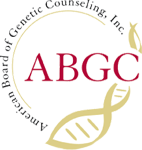About Genetic Counselors
Who are genetic counselors?
Genetic counselors are Master’s-trained health care professionals who combine their knowledge of basic science, medical genetics, epidemiological principles, and counseling theory with their skills in genetic risk assessment, education, interpersonal communication and counseling to provide services to clients and their families for a diverse set of genetic or genomic indications.
Genetic counselors help people “…understand and adapt to the medical, psychological and familial implications of genetic contributions to disease.” The process of genetic counseling “… integrates the following: Interpretation of family and medical histories to assess the chance of disease occurrence or recurrence. Education about inheritance, testing, management, prevention, resources and research. Counseling to promote informed choices and adaptation to the risk or condition.” (National Society of Genetic Counselors’ Definition Task Force, 2006.)
Boston University Master’s in Genetic Counseling program is accredited by the Accreditation Council for Genetic Counseling (ACGC), located at 4400 College Blvd., Ste. 220, Overland Park, KS 66211. ACGC can be reached by phone at 913.222.8668.
Where do Genetic Counselors Work?
Genetic counselors are employed in many settings such as medical centers, physician offices, health maintenance organizations, advocacy organizations, governmental agencies, public health departments and biotechnology companies. Those in clinical practice provide education and counseling in areas including reproductive genetics, infertility and preimplantation genetic diagnosis, pediatric genetics, newborn screening follow-up, cancer genetics, neurogenetics and cardiovascular genetics. Many genetic counselors are actively involved in teaching and research. The profession is growing rapidly with the number of certified genetic counselors increasing over 400 % since 1992.
The National Society of Genetic Counselors (NSGC) website offers additional information about who genetic counselors are and how/where they practice.
Why should I become a genetic counselor?
Genetic counselors possess the expertise and skills necessary to be key players in the integration of genomics into health care and in personalized medicine. As a result, opportunities for genetic counselors continue to grow. In addition, genetic counselor job satisfaction is high, especially with regard to counseling patients, learning opportunities, scientific content and the opportunity for personal growth.
If you want to work on the cutting edge of genomic medicine in a rewarding and expanding health care profession, then genetic counseling is the profession for you.
How do I become a genetic counselor?
The first step is to apply to an accredited genetic counseling graduate program. Currently, there are over 55 accredited programs in the United States and Canada, located at both private and public universities. Programs differ with regard to coursework requirements and the types of clinical experiences available; however, all have to meet the same accreditation standards. Only students who have graduated from an accredited program are eligible to take the national genetic counselor certification examination.
You can also visit the National Society of Genetic Counselors for more information about becoming a genetic counselor.
What are the admissions requirements?
In general, you must have a 4-year baccalaureate degree and undergraduate coursework in biology, chemistry, organic chemistry, biochemistry, genetics, statistics and psychology to be eligible to apply. In addition, you typically you need to do the following:
- Take the Graduate Record Examination (GRE) General Examination. Learn more about registering for the GRE.
- If you are an international student, take the TOEFL Examination. Learn more about this exam.
- Submit transcripts from all the undergraduate and graduate institutions you attended
- Obtain letters of recommendation
- Write a personal statement
- Get advocacy experience volunteering as a counselor (e.g., crisis counseling, bereavement counseling) or working with individuals who have a genetic conditions or disability
- Job shadow or speak to a genetic counselor to show you have explored the field and are familiar with the profession.
- Research and/or laboratory experience can also strengthen your application
Individual programs have specific requirements. To learn about these, contact the program directly. You should review each program’s admissions criteria before applying.
Other Considerations
- Costs associated with tuition and living expenses and the availability of financial support/scholarships/assistantships vary between programs. Take these factors into consideration before you apply.
- You do not need to apply immediately after college to be a successful applicant. About half of students enter programs right after completing their undergraduate degree. However, many have entered a year or two after graduating or several years later after having significant work or professional experience. Such applicants are viewed favorably.
Who gets accepted to genetic counseling programs?
The average GPA for accepted students into an accredited genetic counseling program is approximately a 3.5. The most common undergraduate majors among those admitted were biology, genetics and psychology. However, successful applicants come from a broad variety of majors and degrees. Diversity in educational background is welcomed by programs.
What can I do to improve my chances of acceptance?
- Apply to more than one program. In general, those who apply to 4 or more programs are more likely to be admitted than those who apply to 1-2. Be thoughtful, strategic, and selective about which programs you are applying to and that they are a good fit for your personally and your career goals.
- If you are applying a second time, seek feedback from program directors about how to strengthen your application as this can increase your chances of being admitted.
- Contact the programs to make sure you are familiar with and are fulfilling their specific requirements.
- Familiarize yourself with the profession by doing the following:
- Review the National Society of Genetic Counselors’ (NSGC) code of ethics, position statements and policy statements.
- Read the genetic counseling literature, including the Journal of Genetic Counseling.
- Job shadow, volunteer with or speak to a genetic counselor. Many genetic counselors are very willing to talk to potential applicants. Find a genetic counselor in your area.
You can find a list of accredited programs at the Accreditation Council for Genetic Counseling (ACGC) website at www.gceducation.org.
